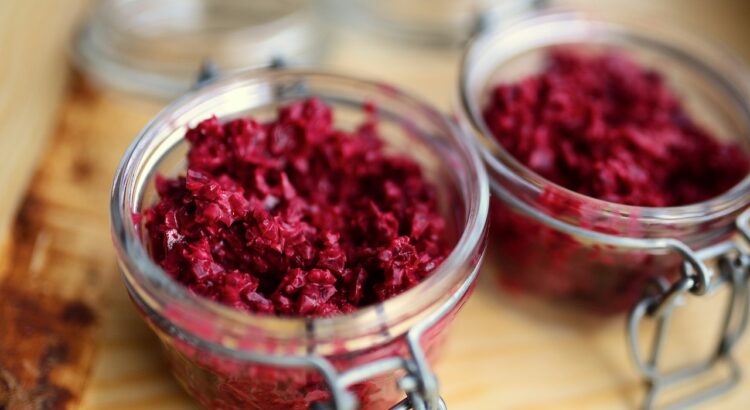Introducing fermented beetroot and red cabbage into the daily diet may be helpful in the prevention of diet-related diseases and may protect against chronic inflammation in these diseases, scientists from our Institute have shown. The researchers looked at biologically active compounds capable of inhibiting the process of protein glycation. This process, which is one of the features of diabetes, leads to the intensive combination of sugar with proteins, which are then deposited in cells, negatively affecting their function.
This is the first study to show a link between the content of individual bioactive compounds (phenolic acids, flavonoids, anthocyanins and betalains) and antiglycation properties following spontaneous (i.e. spontaneously occurring) fermentation of beetroot and red cabbage.
– We have shown that the fermentation of these vegetables had a beneficial effect on the content of those components that have the ability to inhibit protein glycation. After all, the accumulation of Advanced Glycation End-products (AGEs) is one of the key mechanisms leading to diabetic complications, such as nephropathy and diabetic retinopathy – emphasises study leader Dr. Małgorzata Starowicz, acting head of the Team of Chemistry and Biodynamics of Food at the Institute of Animal Reproduction and Food Research of the Polish Academy of Sciences in Olsztyn.
THE POWER OF NATURAL COLOURS
Beetroot and red cabbage are popular in Poland not only for their culinary tradition, but also for their numerous health benefits. Rich in antioxidants, vitamins, minerals and fibre, they support the health of the heart, cardiovascular, immune or digestive systems, making them valuable components of a healthy diet.
Beetroot owes its characteristic colour to betalains and red cabbage owes it to anthocyanins, natural pigments which, in addition to their colouring properties, have numerous health-promoting effects, including being powerful antioxidants (neutralising harmful free radicals that have a negative impact on the body, e.g. by contributing to faster ageing).
Another property of antioxidant compounds (antioxidants) is that they do not cause sugar to combine with proteins (glycation), resulting in excessive sugar accumulation in the body. This process intensifies during hyperglycaemia – one of the features of pre-diabetes or diabetes itself.
BENEFICIAL FERMENTATION
Combining these issues, the researchers wanted to test whether the fermentation process of beetroot and red cabbage increases their anti-glycation properties. And they demonstrated that this is indeed the case.
– Fermentation of vegetables has significantly increased the bioavailability and thus the biological activity of key bioactive compounds. Raw vegetables have a naturally high content of bioactive compounds, but their bioavailability in the human body is limited by, among other things, the tight bonds between these compounds and the plant cell structure. The fermentation process breaks down these structures, releasing the bioactive compounds. Furthermore, the fermentation process leads to the formation of new beneficial metabolites. As a result, fermented beetroot and red cabbage have stronger antioxidant and anti-inflammatory properties, making them more effective in diabetes diet therapy, compared to their raw counterparts. It is important to understand these processes in order to be able to optimise the fermentation conditions to increase the health benefits of the final products – points out study co-author Dr. Natalia Płatosz from the Team of Chemistry and Biodynamics of Food at the Institute of Animal Reproduction and Food Research of the Polish Academy of Sciences in Olsztyn.
Why fermentation? – Fermentation, which is one of the longest known natural methods of food preservation known to mankind, is returning in favour and becoming very popular. In addition to the most popular pickled cucumbers or sauerkraut in Poland, we are opening up to new flavours, such as kimchi. In our study, we also wanted to show that our local vegetables subjected to the fermentation process gain not only a unique taste and texture, but also a number of health-promoting benefits, which may increase their attractiveness and encourage consumption of larger amounts of these products – explain the researchers.
FERMENTED FOODS AND DIET
In their view, this knowledge can benefit both consumers and food producers.
– Increased awareness of healthy lifestyles among the public may make fermented products increasingly popular, especially for people with diabetes or pre-diabetic conditions. In the context of food processing, fermentation is one interesting technique to further increase the bioavailability and health benefits of bioactive compounds contained in fruit and vegetables. Therefore, collaboration between researchers and food producers on the fermentation process and the impact of fermentation end products on human health is essential and can lead to the development of new, innovative products that meet the high expectations of consumers. Such products can be promoted as part of a diabetic-friendly diet and thus increase their market value – the researchers emphasise.
The findings were published in the journal ‘Foods’ . This is basic research, conducted in vitro. However, the authors do not rule out continuing and conducting further stages of research, including with humans.
– We have shown that the introduction of fermented beetroot and red cabbage into the daily diet can be helpful for prevention and protect against chronic inflammation in diet-related diseases. However, we should remember that the consumption of raw as well as fermented vegetables should be combined with a balanced diet and, if necessary, appropriate treatment, the researchers conclude.
